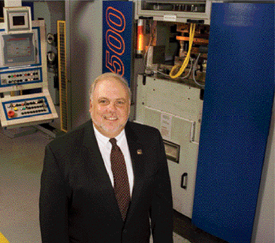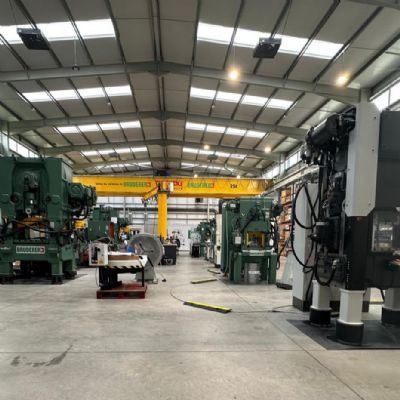While succeeding in a global market means finding customers all over the world, and many PMA member companies do export quite a bit, it also means competing for opportunities in North America provided by transplant companies. As an example, Hardt points to the recent announcement from Toyota that it plans to broaden its U.S. stamping supply base to include two new plants—in Tupelo, MS, and Ontario, Canada—of Japanese transplant supplier Toyota Boshoku Corp.
“If you’re supplying stampings to Johnson Controls (JCI) on behalf of Toyota, now you have to find a to grab some of that business from Toyota Boshoku,” says Hardt, with a reminder that this represents only one example of what is sure to become a growing trend of foreign Tier suppliers following OEMs to the United States. “This obviously represents a dramatic shift in the supply chain,” Hardt says, “and requires an equally dramatic shift in how we operate our companies. Transplant OEMs from Asia and Europe have been here for a long time, and now their suppliers are building new plants here to localize the supply chain. The market is global, and we must figure out how to fit into this new market, and prosper.”
Asked to reflect on how U.S. metalformers can make this happen, Hardt quickly recounts his own experiences with global marketing. “First,” he says, “you’ve got to identify the decision makers within the purchasing supply base. If they reside in Japan or Germany, then you had better get on a plane and visit them. You have to express an interest; you have to get your name known. And, you clearly have to be accepted by the North American management team as well, in addition to having good, high-quality products and services.
“Not enough people in this country realize how important relationship development is to doing business globally,” continues Hardt. “While we’ve lost that to a certain degree in the United States, in Europe and in Asia relationships in business are critical success factors. This requires executive commitment,” he stresses. “As an example, when trying to connect with one of our customers in Japan a few years ago, it took me five separate trips until I finally landed a meeting with the president of the company, and the key decision maker.”
PMA offers North American member companies opportunities to learn about global markets, via study missions. And, many of these same companies produce globally and are some of the best performers in the industry. Next year’s ICOSPA event offers tremendous opportunities for building relationships with overseas companies. Delegations are expected from as many as 15 countries.
“Come to the ICOSPA Congress and you’ll be able to meet other metalforming companies and large tier suppliers from all over the world,” says Hardt. “What opportunities do these types of relationships offer? The list is long. For starters, if you don’t have relationships with transplant automotives, then you’re missing out on more than half of the market. And if you’re in electronics—reel-to-reel, deep draw, etc.—and you don’t have relationships with Asian companies, you won’t make it.”
How does Hardt envision the relationship-building process growing from the foundation afforded by a visit to the ICOSPA Congress?
“Come to the event, look over the attendee list and identify companies that might match your needs and your capabilities, in order to become partners and begin building relationships,” he says. “Look to build partnerships where both companies can grow globally together. Benchmark each other, visit each other’s facilities and learn what each does best. Gain market intelligence, find out what challenges other companies face around the world, and what opportunities are out there.”
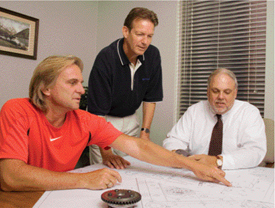 |
| Hardt, toolroom manager Tim Runyan (left) and plant manager Beat Andres discuss the layout for a new project at Feintool. |
Playing a Global Game Requires a Level Field
“This is a very good time for U.S. manufacturers to look hard at opportunities to export their products,” stresses Hardt. “Due to currency valuations, we are a low-cost producer globally, and metalforming companies need to take advantage of the opportunities that are out there. We can build tools here, stamp parts and assemble here, and supply customers in Europe or Asia.
“However, there remain a few hurdles to successful exporting,” Hardt warns, “namely the lack of free and fair trade. For this reason, advocacy remains a critical function for PMA, a highlight of our strategic plan for my term as chairman, and beyond. The focus must be on creating a level playing field for free and fair trade.”
The PMA Government Relations/ PMAVIC Committee follows a focused agenda that directs PMA staff, its lobbying firm and its public-relations counsel to promote positions that are determined by an annual survey of PMA member companies. Among agenda items that relate to Hardt’s emphasis on free and fair trade:
• Currency misalignment
• Reforming and enforcing trade laws
• Ensuring access to raw materials.
“China and other nations continue to misalign their currency,” Hardt says, “giving their industries an unfair advantage over U.S. manufacturers. PMA President Bill Gaskin has testified before Congress, urging it to take a stronger position against currency manipulators. And, members of the PMA board of directors have met with the administration’s point person on China to drive home the injury that currency manipulation has on small and medium-sized manufacturing companies. In addition, two PMA members, Wes Smith (PMA’s 2007 chairman) and Dick Wilkey, have met directly with the Secretaries of Treasury and Commerce, and with the U.S. Trade Representative. Smith and Wilkey also are members of a manufacturing task force that regularly consults with the administration on China matters.”
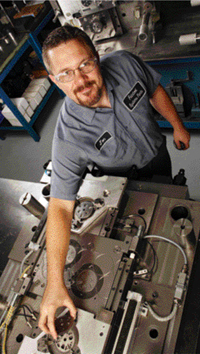 |
John Castle, leadman toolmaker at Feintool, works on a progressive transfer fineblanking tool that produces complex automotive-seating parts. “We’re focused on building all of our own tooling,” says Ralph Hardt. “We consider ourselves to be a technology company, not just a metalformer. Building tooling locally allows us to start new projects from day one.”
|
PMA also has committed to fighting, on behalf of metalforming companies, against counterfeit goods. It continues to coordinate efforts with groups such as the Coalition Against Counterfeiting and Piracy (CACP) and the U.S. Chamber of Commerce. Last year, PMA’s lobbying firm The Franklin Partnership (TFP) worked with Sen. Debbie Stabenow to create legislation to strengthen the Office of the U.S. Trade Representative to provide additional funding for trade-law enforcement. TFP continues to work with lawmakers to grant additional resources for these efforts, and on numerous occasions it has arranged for our government officials to include concerns of PMA members, including tariffs applied by the Chinese government on U.S. automotive components bound for customers in China.
“The administration continues to negotiate on behalf of PMA members and U.S. manufacturers to address these issues,” says Hardt. “As a result of direct pressure applied by American businesses, President Bush has made fighting counterfeiting and IP theft among his top trade priorities. Last March, TFP met directly with Chinese government officials to provide examples of and discuss concerns about currency misalignment, intellectual property theft, illegal subsidies and other trade violations.”
Last but not least, in its fight to ensure access to raw materials for U.S. metalforming companies, the PMA Government Relations team continues to work with congressional committees and members of Congress to include legislation to grant full-party status to domestic industrial consumers in trade cases. Rep. Joe Knollenberg recently testified on behalf of PMA and steel consumers supporting his legislation to give PMA members a seat at the negotiating table.
“These negotiations will continue into early next year,” says Hardt, as legislators work to develop a comprehensive and balanced approach. Earlier this year, Gaskin testified before Congress explaining how many small middle-market manufacturers are left out of the process due to outdated trade laws. Also, three PMA members testified before the U.S. International Trade Commission (ITC) on August 1, asking that the administration discontinue applying tariffs, in some cases a 243-percent tax, on imports of certain hot-rolled steel products. PMA’s public-relations counsel, The PBN Company, arranged for several strategically placed news articles to support our industry in the court of public opinion. The Wall Street Journal published an editorial calling on the ITC to stop taxing our largest input, and specifically highlighted the damage being done to PMA members.
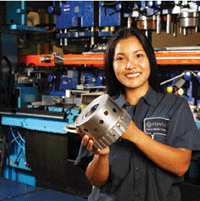 |
| Feintool press operator Kanlayanee Chindavanh proudly displays a fineblanked transmission hub produced at the company using in-die spline rolling, technology first developed and implemented in Europe and brought to North America by Feintool. |
“Next year is a presidential election year,” Hardt offers, “and we need to continue to be heard as the voice of manufacturing in Washington, D.C. As a result of our efforts over the last several years, we are known very well now by the legislators on Capitol Hill, and now it’s time to maximize our leverage to level the playing field for U.S. manufacturers.”
Building a More Inclusive Association
Hardt recognizes that as more and more transplant stampers set up operations in North America, PMA must convince them to become members. The benefits of membership apply to transplant metalformers just as much as they do to the natives.
“PMA will focus on marketing association membership to the new transplant metalforming companies, promoting the valuable networking opportunities we afford at the local district and national levels, as well as our educational offerings at seminars and conferences. As I get more deeply involved in PMA, I learn so much more about what the association offers the metalforming industry. A perfect example of that comes from having served on the PMA Educational Foundation’s board of trustees for the past year. The board members as well as the trainers, educators and training providers that I work with have a real passion for what they do, and lead the foundation’s efforts to provide worldclass workforce-development resources to PMA members.
|
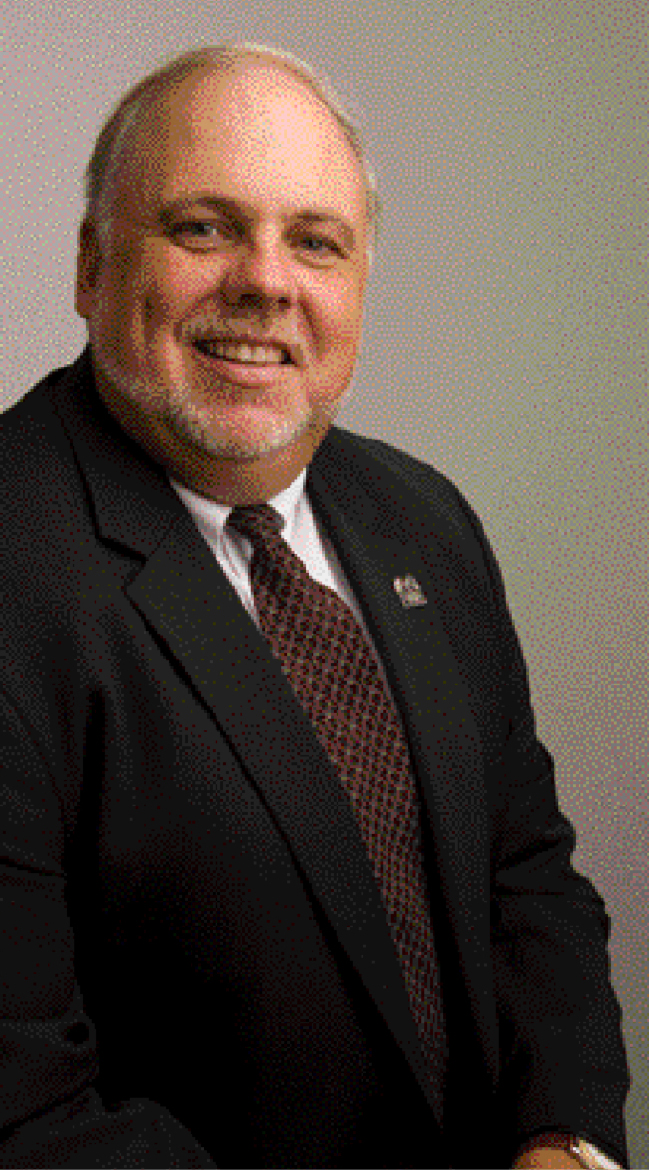 How can companies improve strategically, operationally and financially in order to survive? That’s the question faced often by PMA’s 2008 Chairman-elect Ralph Hardt when he served throughout the 1980s as an Ernst & Young consultant. Working with the firm’s Operations Consulting Group in Pittsburgh, PA, Hardt focused his efforts on middle-market businesses, working to improve operations and to implement business-improvement initiatives, specializing in manufacturing. This after earning his BA in Business Administration and a minor in Manufacturing Systems from the Indiana University of Pennsylvania, in 1982. How can companies improve strategically, operationally and financially in order to survive? That’s the question faced often by PMA’s 2008 Chairman-elect Ralph Hardt when he served throughout the 1980s as an Ernst & Young consultant. Working with the firm’s Operations Consulting Group in Pittsburgh, PA, Hardt focused his efforts on middle-market businesses, working to improve operations and to implement business-improvement initiatives, specializing in manufacturing. This after earning his BA in Business Administration and a minor in Manufacturing Systems from the Indiana University of Pennsylvania, in 1982.
“Plenty of people know what they need to do today,” Hardt says, “but how many know what they need to do tomorrow? Do they really know what they need to change in order to continue to succeed?"
Hardt put his manufacturing-specific education and 11 years of consulting experience to the test when he joined Oberg Industries in 1993 as vice president of corporate development. With Oberg, a global provider of stamping dies and components, precision stamped parts and automated systems, Hardt oversaw the firm’s push toward international expansion. During his tenure the firm also opened a new manufacturing facility, the Oberg Stamping & Technology Center, focused on value-added in-die and external component-part automation and assembly. He became the firm’s president and CEO in 1997 and, among other accomplishments before leaving the company in 2003, Hardt led the campaign to form Oberg-Costa Rica in 2002.
In 2003 Hardt joined his current employer, Feintool, Intl., as president of North American operations. He also serves with the firm’s executive management group. The firm manufactures fineblanking presses and riveting systems, engineers automation systems, and operates in five locations around the world to supply fineblanked parts and plastic/overmold components.
“We are 90 percent automotive,” Hardt shares, “with a major presence in North America, Europe and Japan. We’ve been in North America for more than 30 years and in Japan for more than 20 years.”
Feintool holds several patents on tooling technology used for fineblanking seating components, and has recently grown its presence in the powertrain market, providing transmission parts. Among its bread-and-butter applications: seat-recliner mechanisms and seatbelt anchoring systems, transmission components, safety and security devices, and medical components.
“A focal point for Feintool has been and continues to be to grow the application base for fineblanking,” Hardt continues. “Our success comes primarily from the fact that we consider ourselves to be a technology company, not a metalformer. We develop and build all of our own tooling, allowing us to start new projects from day one and helping us to develop new applications for fineblanking technology. To drive costs out of a new part, as well as ensure high quality, you need to design for those parameters up front. You can’t do that for your customers unless you have skilled engineering, prototyping and tooling resources.
“Stampers have to be able to do much more than just build parts to print,” Hardt adds. “And this is what concerns me about so many metalforming companies today. How do they differentiate themselves, what are they doing to add value? Technical leadership and innovation is what I’m preaching—at Feintool and as PMA’s 2008 chairman.”
|
“As an example, the PMAEF Best Practices Workshop is quickly becoming a signature event,” continues Hardt. “For the second consecutive year, this workshop hosted PMA district leaders and their local educators, who came together to share how, locally, they are meeting the training needs of metalforming companies. This year more than 30 people from 14 districts attended the program, and many of the presenters had received grant funding from PMAEF to assist in implementing their programs.”
It’s also important to note the foundation’s participation in and support for the National Institute for Metalworking Skills (NIMS). “At the NIMS board meeting in Washington, D.C., held last May,” says Hardt, “Assistant Secretary of Labor Emily Stover DeRocco recognized the nation’s first NIMS Certified Press Setup Operator: Landon Fleeger, from PMA member company Penn United Technologies. Fleeger successfully met the requirements of the National Guideline Standard for Apprenticeship-NIMS Press Setup Operator as approved by the U.S. Department of Labor. Then, in September, David Buxton and Kevin Miller of Ohio Stamping and Machine LLC became first in the nation to earn the new OJT Trainer Certifications from NIMS. These certifications were earned as part of the NIMS Structured On-The-Job Training Program being launched nationally this month.
“I encourage everyone in our industry to watch for the announcement of this program,” Hardt continues, “and evaluate NIMS certifications and apprenticeships to see how they can help meet employee-training needs.”
Further, to boost PMA’s efforts regarding training and education, Gretchen Zierick, PMAEF chair for the past two years, recently announced the creation of PMA University. The first step of this initiative has been to package all of the PMA and PMAEF training and education programs and services into a bundle to allow stampers to easily identify those that will meet a company need. The association also expects to retain technical experts on staff and make them available to members.
Lastly, a new funding campaign was recently launched to help support the foundation’s efforts. Dubbed the Legacy Partner campaign, it addresses planned gifts in the form of bequests to the foundation. “Continued support of the Educational Foundation, whether through a legacy bequest, a current endowment contribution or an annual partnership, plays a key role in preserving the future of the industry,” Hardt stresses.
An Association is Only as Good as Its Members Allow it to Be
Hardt brings a unique perspective to PMA membership, since his company stamps parts as well as manufactures metalforming equipment. This dual role gives him insights into the needs of manufacturing members (metalforming companies) as well as associate members (equipment and service providers to the industry). It also allows him to truly understand how member participation makes the association stronger and more effective, for everyone involved.
“Growing manufacturing membership, including attracting transplant companies, benefits our associate members,” Hardt says. “The relationships between manufacturing and associate members are critical to explore, as the networking opportunities available include providing metalforming companies access to key people working amongst the companies that supply metalforming equipment and services.”
These relationships allow stampers to identify suppliers of products and services in a timely manner—important, for example, when you need to quickly get up to speed when you land a new contract. “The manufacturing companies that will survive and prosper in a global market need the best raw material inputs and most economical manufacturing methods, the best quality coming off the presses and industry-leading inspection systems, packaging methods, assembly and welding technology, etc.,” says Hardt. “And all of this becomes easier to accomplish thanks to strong relationships with the suppliers to our industry—PMA associate members.
“At the same time,” Hardt continues, “associate members, through networking with manufacturers, stay tuned to the marketplace and up to speed on what plants might be expanding, what companies are planning to build new facilities, etc.”
Hardt stresses that members do themselves a great injustice if only one or two people from their company participate in PMA activities, rather than several people from several areas of the organization.
“I’d bet that only about 20 percent of our members really accrue the networking benefits available to them by having several people from their companies participate in the association, rather than just one or two,” Hardt says. “It’s critical that people throughout your company understand what’s going on in the industry and are out there learning what’s possible, getting new ideas, thinking innovatively and benchmarking to learn from others. So not only do we need to grow membership (and Hardt has an aggressive goal in this area), but we need to grow participation by members.”
The Boundless Benefits of Networking
Asked to describe how broad participation in PMA activities by his employees has paid off for Feintool, Hardt recalls several. The company’s CFO, Karl Frydryk, attends the PMA CFO Roundtable; its director of IT, Rick Bachman, belongs to the PMA Next Generation Leaders Division and attends fly-ins to Washington, D.C.; and its purchasing director, Mike Drott, is very active in the PMA Ohio Valley District, as is quality manager Todd Lewis.
“Recently we formed a new program-management department to assist with the launching of new tooling projects,” shares Hardt. “To do so, we benchmarked program management techniques at four PMA member companies, to investigate different approaches to launch planning, risk analysis, software and meeting management. The relationships that allowed us access to these companies came from PMA membership activities, and as a result we were able to develop a four-person program-management team that was able to hit the ground running in just a few months.
“In another case, we just this year decided to replace our IT systems, and through the PMA IT roundtables, as well as benchmarking some PMA member companies, we were able to quickly identify a top-notch systems provider with vast experience in the metalforming industry. This came about thanks to one of our employees, Rick Bachman, being active in the association and attending the IT roundtables. Our launch time for implementing the new system would have taken at least an additional six months if Rick had not been active in the association and developed relationships with other member companies.”
In other examples of membership paying off, Hardt says that his company’s involvement with the PMA Tool and Die Division, which he helped get off the ground in 2001, has led to use of new tool steels and coatings, “that have clearly improved the performance of our tooling,” he says. “And to help establish better press-operator training programs, we hired, as training consultants, trainers employed by another PMA member company.”
Bottom Line: Invest, in Yourself and in Your Organization
Hardt wraps up his views and ties together his emphasis on membership involvement, networking and globalization:
“While I’m concerned for the state of our industry right now, I’m convinced that we can persevere provided we become leaders and work to make one plus one be greater than two,” Hardt says, referring to the value of networking with peers. “If you love what you do in metalforming, at your own company in your corner of the world, then you should want to surround yourself with others in the industry that feel the same . That’s why I’m involved with PMA, and why others should get involved.
“At the same time, you have to invest in your organization if you plan to succeed globally,” Hardt stresses. “This will test the skills of your people, and, in fact, you might need different people to get it done. But it’s got to happen. Such is the state of manufacturing today.” MF
See also: Penn United Technologies, Inc.
Technologies: Other Processes, Stamping Presses






